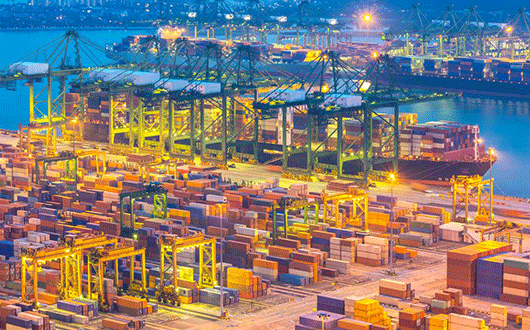Whenever international oil prices shoot up, they unleash havoc on the Pakistani trade balance. When oil prices collapsed, the country’s economic managers had exuded confidence that the opportunity would be capitalized by taming the wild trade deficit. Yet the benefits of the era of soft commodity prices have not accrued commensurate benefits in the current fiscal to date.
While the import bill has registered higher tallies under other heads including food, transport and machinery; it is the country’s exports that have disappointed in 10MFY15. Within the food group, virtually all major cash earners saw stymied exports in the period under review.
The Ministry of Commerce had earlier conceded that appreciation of the local currency against the US Dollar has taken a major toll on exports of non-basmati rice. The latest trade data released by FBS confirms that this negative impact is not limited to rice exports.
Better exports of knitwear and readymade garments on the back of GSP Plus status had been a saving grace in earlier months of the fiscal. However the recent depreciation of Euro may be trouble brewing for these segments also as exports growth in knitwear was off pace in Jan-Apr 2015 as compared to the same period of the previous fiscal.
Resultantly, textile group exports have dropped marginally in 10MFY15, when compared against the similar period of the previous fiscal. Exports of raw cotton, cotton yarn and cloth have been in trouble in an era of soft international commodity prices and slowdown in Chinese demand.
Similarly, exports of other major export industries including leather and associated manufactured goods, chemical and pharmaceutical goods and engineering goods have taken a hit in 10MFY15 over 10FY14.
When the dust settled on the month’s international trade, exports painted a dismal picture with cumulative exports down $1.057 billion in 10MFY15 when compared to 10MFY14.
Moving on to the import side; mushrooming demand for food and machinery imports continues to trump the benefit derived from lower international oil prices which has taken the edge of petroleum imports. Imports of milk, wheat, tea and pulses have contributed to the inflation imported food bill but the real culprit is among non-essential food products.
And it is evident that the oil price bonanza may get less bountiful now. Petroleum imports in the outgoing month were up by a chunky 37 percent over the previous month following firmer international rates and rising volumetric sales at home.
Machinery importers have stood to benefit from the strength of Pakistani Rupee. While importers have used the opportunity to pile up power generation and telecom equipment, imports of office equipment and agricultural machines have also picked up in Jan-Apr 2015 period.
These columns have dissected the import surge to highlight needs to curtail non-essential imports while encouraging capacity enhancing imports within machinery, transport and other heads. But so far the space created by lower oil prices has not been capitalized.
This article was originally published on June 1, 2015, in the Business Recorder (BR) research.





